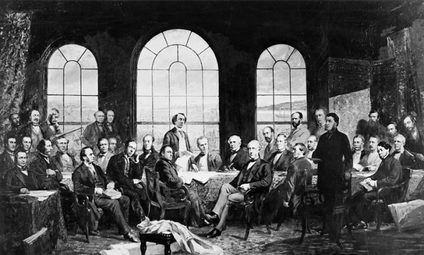
BENNETT BLOG
January 26, 2015
If you have heard anything about the Canada’s Premiers meeting in Ottawa on January 30, you probably know the Prime Minister is not attending. So--like the media--you are not paying much attention to it.
That’s unfortunate because it just might be the biggest climate change meeting ever in Canada. Or maybe it’s a good thing that the Prime Denier stays home. We’ll see.
The Premiers have been working on a “National Energy Strategy” for a couple of years now-- a very taboo subject that once would have enraged Alberta politicians. Why? You may remember that back in 1980 the federal government created a “National Energy Plan” (NEP). The NEP was designed to promote oil self-sufficiency for Canada, promote Canadian ownership of the energy industry, promote lower prices, promote alternative energy sources, and increase government revenues from energy sales.
Alberta viewed the NEP with great hostility and saw it as a wealth-grab from their resource-rich coffers. It’s why Alberta wanted nothing to do with a national climate change plan and withdrew from discussions when the Chretien government said it would ratify the Kyoto Protocol. Over the decade since, the provinces have gone their own way on climate change while the federal government stepped back, ultimately withdrawing from the Kyoto Protocol.
Then a curious thing happened; Canadians and Americans woke up to the fact that you can’t fight climate change by vastly increasing oil and gas production and building pipelines to transport it. As I once told a GM vice president (who’d just spent half an hour explaining how by changing paint and using recycled foam the car industry was protecting the environment), “it’s the product that’s the problem.”
The huge public opposition to expanding oil/gas infrastructure in both countries gave the Premiers pause. The governments in British Columbia, Ontario and Quebec all began raising questions about pipelines crossing their territory. What’s in it for us, they began asking. They bear the risk, after all. Suddenly, what once was deemed to be a “no brainer” had many thinking.
So a couple of years back the Premiers actually agreed to talk about a “National Energy Strategy” for Canada. It was a “wow moment”. These are words Ralph Klein would never utter.
Then Kathleen Wynne was elected in Ontario, talking big ideas in a lot of areas including action on climate change. Some observers (more cynical than I) suggest she was just trying to distract the public from her scandal-ridden government’s past. But, after 25 some years, I’ll take real action on climate change whatever the motivation.
So the stage is set. Western oil producers want access to tide water and need energy corridors. Ontario, Quebec and (to a lesser extent) British Columbia have strong climate change ambitions. New Brunswick and Nova Scotia have already rejected fracking by popular demand, and no one believes leaky pipelines and risky oil tankers will be any more acceptable.
Word is this Friday’s discussion will center on whether or not dealing with climate change will be part of the Premiers’ National Energy Strategy. Now you and I can’t imagine one without the other, but we are not Premiers.
Regardless, there will be premiers in the room who need things from each other. Mutual--even if diverse--needs are the basis of all political deals. So this meeting is probably our best shot at getting national climate change action, if you think about it, that’s how we got a country.
Fingers crossed.
John Bennett, National Program Director
Sierra Club Canada Foundation
1510-1 Nicholas Street
Ottawa, Ontario K1N 7B7
jb@sierraclub.ca
John on Twitter / Bennett Blog

